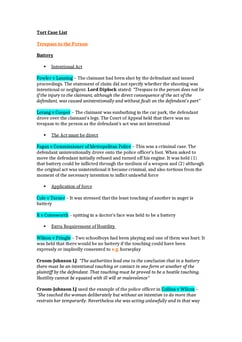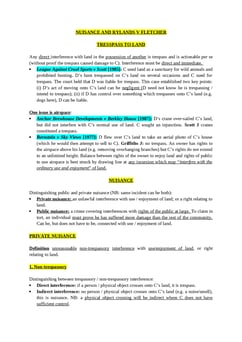McLoughlin v O’Brian [1983] 1 AC 410
Judgement for the case McLoughlin v O’Brian
KEY POINTS
Defendants' negligence caused a catastrophic road accident, focusing legal analysis on defining the duty of care and its boundaries to ensure justice.
On assessing foreseeability regarding the plaintiff's nervous shock and explore if the duty extends beyond the accident scene societal and policy implications are to be understood, aiming to deepen understanding of complex legal responsibilities and their broad impacts.
FACTS
In 1973, the plaintiff's husband and three children were in a road accident involving multiple lorries. The plaintiff was at home, two miles away. Later that day, she learned about the accident from a neighbor and saw her injured family in the hospital, including her daughter's tragic death. She claimed severe shock, leading to psychiatric illness.
In 1976, she sued the defendants for damages, alleging their negligence caused her injuries. The defendants admitted liability for her family's injuries but denied their negligence caused her harm.
During the trial, Boreham J. assumed her condition was due to shock but ruled for the defendants, stating they owed no duty of care as her injury wasn't reasonably foreseeable.
The Court of Appeal upheld this decision, citing legal precedent and policy reasons, as the plaintiff wasn't at the accident scene and didn't witness it promptly.
The plaintiff has appealed this decision.
JUDGEMENT
The appeal was allowed.
It was held that the nervous shock, assumed to have been suffered by the plaintiff, had indeed been the reasonably foreseeable consequence of the injuries sustained by her family due to the negligence of the defendants.
The Court found that policy considerations should not impede a decision in favor of the plaintiff. Therefore, the plaintiff was entitled to recover damages.
COMMENTARY
In 1973, the plaintiff's husband and children were involved in a multi-lorry road accident, an event that unfolded while she was at home, two miles away. It was later in the day when the news reached her through a neighbor. The plaintiff rushed to the scene to witness the injuries inflicted upon her loved ones, including the loss of her beloved daughter, an experience that would lead to severe psychological trauma and psychiatric illness.
In 1976, seeking justice for the pain and suffering inflicted upon her life, she embarked on a legal journey, suing the defendants. Her claim alleged that the defendants' negligence was the root cause of her injuries. While the defendants acknowledged their responsibility for the injuries sustained by her family members, they disputed any negligence towards her in the matter.
-
The subsequent trial, presided over by Judge Boreham, acknowledged the plaintiff's condition as stemming from the shock she endured on that day. However, despite this acknowledgment, the ruling favored the defendants.
Judge Boreham's decision was rooted in the assertion that there was no duty of care owed to the plaintiff, primarily due to the unforeseeability of the extent of her injury in the aftermath of the accident.
-
The Plaintiff appealed though the Court of Appeal, where an examination of legal precedent and policy considerations took place. It was here that a significant shift occurred - the appeal was ultimately successful, affirming that the plaintiff's nervous shock, a direct result of her family's injuries caused by the defendant's negligence, was reasonably foreseeable.
The Court of Appeal placed particular emphasis on the idea that policy considerations should not obstruct or undermine the plaintiff's fundamental right to seek and obtain the compensation she deserved for her physical and emotional trauma.
ORIGINAL ANALYSIS
Defendant caused a car crash which caused injury to Plaintiff’s husband and killed Plaintiff’s daughter.
Plaintiff, not present at the scene of the crash, sued Defendant for causing her nervous shock and psychological illness through negligence.
HL said that Defendant was liable for negligence since the shock was the reasonably foreseeable result of the crash and that policy considerations should not change this.
Lord Wilberforce
-
The arguments against extending liability to cases of nervous shock are:
Floodgates
Would lead to Defendants being punished beyond their negligent conduct, i.e. overly unfair to Defendant
Creation of evidentiary difficulties and lengthen litigation
Parliament should decide if there should be an extension
However in contrast to this, people should be compensated where they have been caused harm.
-
Wilberforce suggests 3 limitations on such claims:
Firstly, only certain classes of people, e.g. close family members, should be compensated.
Secondly, Plaintiff should have been close to the accident (for establishing “proximity” between Defendant and Plaintiff) in terms of space (e.g. a witness) or time (e.g. as here, where one sees the victims soon after the accident).
Thirdly, the shock must come through “SIGHT or HEARING of the event or its immediate aftermath” and not 3rd party narrative
Lord Bridge (endorsed by others)
Plaintiff has to show that they are not merely suffering the normal symptoms of grief or anguish, but actual psychiatric illness.
Beyond this, normal rules apply to finding a duty of care.
For Further Study on McLoughlin v O’Brian
Need instant answers? Our AI exam tutor is here to help.
Ask questions 🙋 Get answers 📔 It's simple 👁️👄👁️
Our AI is educated by the highest scoring students across all subjects and schools. Join hundreds of your peers today.
Get StartedSimilar Cases
Related Product Samples
These product samples contain the same concepts we cover in this case.
| GDL Tort Law | Negligence Nervous Shock Notes (14 pages) |
| GDL Tort Law | Psychiatric Injury Notes (8 pages) |


 Since 2010, Oxbridge Notes has been a trusted education marketplace, supplying high-quality materials from top achievers at universities like Oxford, Cambridge, LSE, Harvard, and Yale.
Since 2010, Oxbridge Notes has been a trusted education marketplace, supplying high-quality materials from top achievers at universities like Oxford, Cambridge, LSE, Harvard, and Yale.